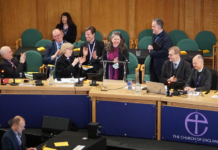The Living in Love and Faith (LLF) process and resources have enabled us, as the Church of England, to explore our different understandings of sex, marriage and relationships and, assisted by the Pastoral Principles, become better at the “good disagreement” that many have called for.
We’ve not always got it right
As those who hold to the historic position of the Church, we in CEEC have found ourselves challenged about our past attitudes, the hurt that we have sometimes caused to LGBTQI+ people, and how we might become more biblically inclusive. We therefore are grateful for much in the bishops’ pastoral letter. We agree the church must value LGBTQI+ people and be a place where everyone is welcome and we too apologise and repent for the times we have failed and continue to fail to love them as God loves them.
A denial of biblical teaching
Sadly, however, we cannot accept central features of the bishops’ proposed way forward. We believe these deny the authority of Scripture and, despite their stated desire not to do so, depart from the received historic understanding of the Church. Jesus offers not only welcome and inclusion but the transforming power of his Spirit experienced through responding to his call to repent, take up our cross, and follow him. Commitment to living in love and faith means that our love must always be shaped by and embedded in the faith we have received.
Keeping Faith
Having supported those participating in the LLF process, CEEC launched its Keeping Faith initiative to help the Church of England keep faith with its biblical inheritance and reaffirm its current teaching on marriage and sexuality that marriage is a lifelong exclusive commitment between one man and one woman, and that sex outside of that should be met with a call to repentance.
A departure from the Church of England’s biblical inheritance and Anglican doctrine
While we recognise and respect the desire of the bishops to find a way forward, which will hold the Church together, we believe that their proposed draft Prayers of Love and Faith cannot do this. This is because they – and further changes some are calling for in the bishops’ revised pastoral guidance to replace Issues in Human Sexuality – do not keep faith with our biblical inheritance and the doctrine of the Church of England on marriage shared with the wider Anglican Communion as expressed in Lambeth 1.10.
‘Compelled to resist’
At the end of January, the Bishop of London, who chairs the Next Steps Group (the group responsible for ‘steering’ the Living in Love and Faith project), wrote to her clergy inviting those “who find themselves compelled to resist the way forward offered by the House of Bishops” to meet with her (approximately 200 did so with others sending apologies).
The declaration that follows is our attempt, as part of our Keeping Faith initiative, to articulate why so many, both clergy and lay, find themselves compelled to resist. It sets out what we will do should the bishops or General Synod continue to press ahead with these proposals unchanged and ignore the serious theological concerns raised both here within the Church of England and across the Anglican Communion.
In support of the declaration
We invite you, if you are part of the Church of England and agree with the declaration below (whether or not you identify with CEEC or describe yourself as an evangelical), to signal your support by signing the declaration.
We recognise that it is not always easy to take a stand but we assure you of the prayers and support of CEEC and the Diocesan Evangelical Fellowship in your diocese.
In due course we will publicly issue the names of supporters and offer the declaration to our bishops in order to impress upon them the widespread and strongly held opposition to their proposals.
The declaration
If the Church of England’s General Synod or House of Bishops:
- authorises or commends liturgical provision for the celebration, dedication, blessing or solemnisation of any sexual relationship other than marriage between one man and one woman, or liturgical provision for the blessing of those in such relationships; or
- removes the bar on clergy being in such relationships; or
- produces pastoral guidance that is indicative of a departure from the Church of England’s doctrine that marriage between one man and one woman is the proper context for sexual intimacy; or
- amends Canon B30 so the Church of England no longer affirms that “according to our Lord’s teaching marriage is in its nature a union permanent and lifelong, for better for worse, till death them do part, of one man with one woman, to the exclusion of all others on either side”;
… we will declare that this action represents a departure from the faith which is revealed in the Holy Scriptures and set forth in the catholic creeds and to which the historic formularies of the Church of England bear witness.
Our desire is to keep faith with this inheritance as members of the Church of England and to remain in full communion with those Provinces of the Anglican Communion who also maintain the biblical and historic teaching of the church catholic.
We will therefore resist all attempts to introduce any of these changes or to marginalise those who, in their own teaching and practice, uphold the received doctrine of the Church of England and the teaching of Jesus on marriage.
We are compelled to resist.



